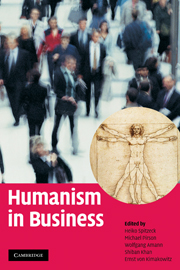Book contents
- Frontmatter
- Contents
- List of figures
- List of tables
- List of editors and contributors
- Acknowledgements
- Humanistic Management Network: paving the way towards a life-serving economy
- Introduction
- Part 1 Philosophic-historical grounding of humanism
- Part 2 Towards an integration of humanism and business on a systems level
- 8 Towards a civilized market economy: economic citizenship rights and responsibilities in service of a humane society
- 9 Development as freedom: individual freedom as a social commitment
- 10 On corporate responsibility for human rights
- 11 The value shift: merging social and financial imperatives
- 12 The ugly side of capitalism: what the young generation needs to combat
- Part 3 Humanistic management
- Part 4 The individual as a change agent for a humane business society
- Index
- References
12 - The ugly side of capitalism: what the young generation needs to combat
Published online by Cambridge University Press: 25 January 2011
- Frontmatter
- Contents
- List of figures
- List of tables
- List of editors and contributors
- Acknowledgements
- Humanistic Management Network: paving the way towards a life-serving economy
- Introduction
- Part 1 Philosophic-historical grounding of humanism
- Part 2 Towards an integration of humanism and business on a systems level
- 8 Towards a civilized market economy: economic citizenship rights and responsibilities in service of a humane society
- 9 Development as freedom: individual freedom as a social commitment
- 10 On corporate responsibility for human rights
- 11 The value shift: merging social and financial imperatives
- 12 The ugly side of capitalism: what the young generation needs to combat
- Part 3 Humanistic management
- Part 4 The individual as a change agent for a humane business society
- Index
- References
Summary
Introduction
Just as the last Marxists are disappearing from the globe, capitalism has shed the “soft” face it developed during its struggle with communism after the Second World War. Currently, capitalism resembles Karl Marx's description of it: harsh, cold, uncompassionate, anti-humanistic, crisis-prone, relentlessly exploiting every country and opportunity for the sake of profit – with the resultant huge collateral damage in terms of people, cultures, and traditions. Greed is omnipresent and even seems to have halted the mechanism that has been driving prosperity and – to some extent – humanistic advances since the Second World War. The failure of the Doha round appears to have been the end of a shared responsibility for an increasingly integrated globe.
This book does not, however, indulge in scare mongering; the focus is therefore not on doomsday scenarios, but on practical alternatives, which are relevant for young academicians. Consequently, this chapter describes what has happened since the collapse of communism and why (section 2 below) as well as the priorities of the required change. The latter focuses particularly on the finance sector dominance of the economy and companies (section 3), resource waste (especially energy [section 4]), and the reminder that life is more than consumption (section 5). In conclusion, some recommendations regarding what young academicians can do to stem these negative trends are provided.
- Type
- Chapter
- Information
- Humanism in Business , pp. 218 - 226Publisher: Cambridge University PressPrint publication year: 2009



